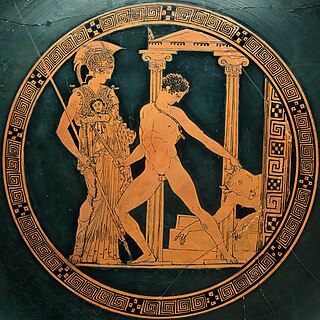Related Research Articles

In Greek mythology, Eurystheus was king of Tiryns, one of three Mycenaean strongholds in the Argolid, although other authors including Homer and Euripides cast him as ruler of Argos.

The Heracleidae or Heraclids were the numerous descendants of Heracles, especially applied in a narrower sense to the descendants of Hyllus, the eldest of his four sons by Deianira. Other Heracleidae included Macaria, Lamos, Manto, Bianor, Tlepolemus, and Telephus. These Heraclids were a group of Dorian kings who conquered the Peloponnesian kingdoms of Mycenae, Sparta and Argos; according to the literary tradition in Greek mythology, they claimed a right to rule through their ancestor. Since Karl Otfried Müller's Die Dorier, I. ch. 3, their rise to dominance has been associated with a "Dorian invasion". Though details of genealogy differ from one ancient author to another, the cultural significance of the mythic theme, that the descendants of Heracles, exiled after his death, returned some generations later to reclaim land that their ancestors had held in Mycenaean Greece, was to assert the primal legitimacy of a traditional ruling clan that traced its origin, thus its legitimacy, to Heracles.
The 12th century BC is the period from 1200 to 1101 BC. The Late Bronze Age collapse in the ancient Near East and eastern Mediterranean is often considered to begin in this century.
The 1180s BC is a decade which lasted from 1189 BC to 1180 BC.
The 1190s BC is a decade which lasted from 1199 BC to 1190 BC.
Celeus or Keleus was the king of Eleusis in Greek mythology, husband of Metaneira and father of several daughters, who are called Callidice, Demo, Cleisidice and Callithoe in the Homeric Hymn to Demeter, and Diogeneia, Pammerope and Saesara by Pausanias.

Triptolemus, also known as Buzyges, was a hero of Eleusis in Greek mythology, central to the Eleusinian Mysteries and is worshipped as the inventor and patron of agriculture. Triptolemus is credited with being the first to sow seed for cultivation after being taught by Demeter and is credited for the use of oxen and the plough. Xenophon claims that Peloponnesus was the first place Triptolemus shared Demeter's agricultural gift while Pausanias claims the Rharium plane near Eleusis was the first place to be sown for crops.

Macaria or Makaria is the name of two figures from ancient Greek religion and mythology. Although they are not said to be the same and are given different fathers, they are discussed together in a single entry both in the 10th-century Byzantine encyclopedia the Suda and by Zenobius.
Edward L. G. "Ted" Bowell, was an American astronomer. Bowell was educated at Emanuel School London, University College, London, and the University of Paris.

Phyllis is a character in Greek mythology, daughter of a Thracian king. She marries Demophon, King of Athens and son of Theseus, while he stops in Thrace on his journey home from the Trojan War.

In Greek mythology, Demophon was a veteran of the Trojan War and king of Athens. The son of Theseus and Phaedra, Demophon was raised in exile by a family friend after his father was deposed. He later fought in the Trojan War, being one of those who hid in the Trojan Horse. Following the fall of Troy and the rescue of his grandmother Aethra, Demophon is said to have landed in Thrace on his return journey, where he met and married Phyllis, the daughter of the king. Leaving for Athens, Demophon promised to return, and when he did not, Phyllis committed suicide in despair. Arriving in Athens after a possible stop in Cyprus, Demophon succeeded Menestheus as king of Athens, supposedly in 1183 B.C. As king, he gave refuge and land to the Heracleidae in Athens, fought Diomedes and wrested the Palladium from him, presided over the creation of the court of the Ephetae, and hosted Orestes during his madness. Demophon died in Athens in 1150 B.C. after a reign of 33 years, and was succeeded by his son Oxyntes.

Children of Heracles is an Athenian tragedy written by Euripides. In the year of 430 B.C., Children of Heracles was performed. It follows the children of Heracles as they seek protection from Eurystheus. It is the first of two surviving tragedies by Euripides where the children of Heracles are suppliants.

Archaeoprepona demophon, the one-spotted prepona, banded king shoemaker, or demophon shoemaker is a butterfly belonging to the family Nymphalidae.

Archaeoprepona is a genus of Neotropical charaxine butterflies in the family Nymphalidae, native to Mexico, Central America, northern South America, and the Caribbean. The underside of their wings is pale brownish, while the upperside is dark with a distinct bright blue band.
Oxyntes was a mythical king of Athens, son of Demophon. He had two sons, Apheidas and Thymoetes, who succeeded him, one another, in the throne. Thymoetes was the last descendant of Theseus on the Athenian throne.
4057 Demophon is a larger Jupiter trojan from the Greek camp, approximately 46 kilometers in diameter. It was discovered on 15 October 1985 by American astronomer Edward Bowell at the Anderson Mesa Station of the Lowell Observatory near Flagstaff, Arizona. The dark Jovian asteroid has a longer-than-average rotation period of 29.8 hours. It was named after the Athen prince Demophon who fought in the Trojan War.

The Sacred Way, in ancient Greece, was the road from Athens to Eleusis. It was so called because it was the route taken by a procession celebrating the Eleusinian Mysteries. The procession to Eleusis began at the Sacred Gate in the Kerameikos on the 19th Boedromion.
In Greek mythology, Demophon or Demophöon, was an Eleusinian prince as the son of King Celeus and Queen Metanira.
Demophon or Demophoon may refer to:
In Greek mythology, Eleusis or Eleusinus was the eponymous hero of the town of Eleusis.
References
- Who's Who in the Age of Alexander the Great by Waldemar Heckel ISBN 978-1-4051-1210-9